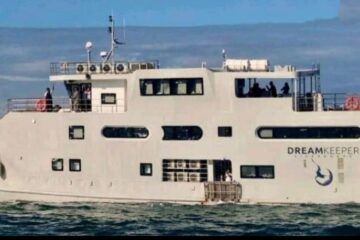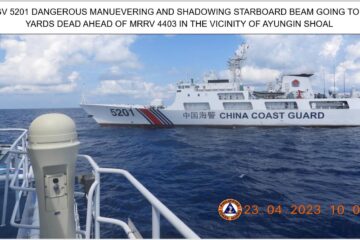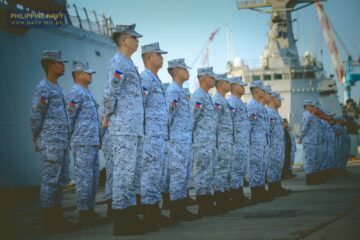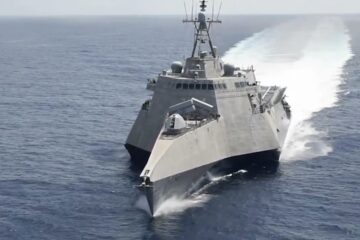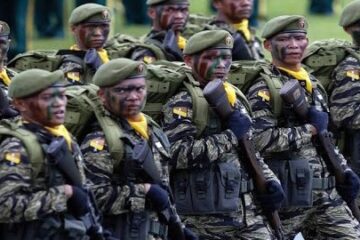JOHN C. STENNIS SPACE CENTER, Miss. – Nine officers from Bangladesh, Malaysia and the Philippines completed the Naval Small Craft Instruction and Technical Training School’s 16th iteration of Strategic Leaders International Course, on August 31.
SLIC, a senior level course, provides international officers a forum to discuss shared challenges, while helping to facilitate the formation of networks and trans-regional organization between partners who operate in the same geographic area and face similar problems. This network allows for an efficient sharing of information between U.S. forces and facilitates efforts with other agencies and international partners.
“First and foremost, NAVSCIATTS’ SLIC offers students a new way of understanding their operational environment through ‘systems thinking,’” explained Robert Gusentine, SLIC director and a retired Navy SEAL captain. “The students are then guided through the process of designing cooperative strategies that shape conditions to their advantage in order to address complex security challenges.”
Supplementing the in-class lectures and exercises, the course included travel to Honolulu to meet with key leaders of various military and interagency staffs that operate within the United States Pacific Command region. It also gave the senior officers the opportunity to connect in person with U.S. military and agency personnel engaged in the respective regions.
In Honolulu, the SLIC officers were briefed at USPACOM, where discussions included the increase in challenges regarding the security environments within the Pacific region. Maritime Domain Awareness, information-sharing through multilateralism and cooperation instead of competition, and the Association of Southeast Asian Nations were also topics of discussion among the partner nation officers and U.S. officers.
“A country alone is very small,” stressed Capt. Rozali Mohamed Said, a current SLIC student and assistant chief of staff with the Malaysian coast guard. “Understanding and trust in our region and world is very important. ASEAN countries can unite and solve problems through peace and cooperation.”
SLIC officers also visited Joint Interagency Task Force West, or JIATF-West, where they were briefed on the agency’s counterdrug and counter transnational organized crime focus that encompasses the countries represented in this course iteration. Since a primary purpose of JIATF-West is to address law enforcement challenges, the joint interagency organization is necessary to be effective at combating drug-related threats. The officers learned how JIATF-West is able to successfully coordinate with multiple agencies and countries to have the greatest impact on drug-related networks in the Pacific region.
In addition, the partner nation officers met with Special Operations Command Pacific country desk officers and planners. SOCPAC representatives shared their mission in order to promote cooperation within the Pacific region and to work with neighboring countries to share information. Roundtable discussions provided the SLIC and U.S. officers with the opportunity to share concerns and challenges in the represented countries and regions.
“The issues our countries face are common,” stated Lt. Cmrd, Julhas Faisal, commanding officer with the Bangladesh coast guard. “We need to have better cooperation, better foresight and better understanding. This course is inspiring all of those things.”
The SLIC course is designed to advance and further develop the strategic thinking and strategic planning skills of senior military leaders and civilian equivalent partner nation personnel from government and law enforcement agencies. SLIC balances seminar discussions, tabletop exercises, and experiential learning to improve the individual and collective ability of attending leaders from across the globe to design successful strategies for the maritime domain.
“In addition to the relevant and dynamic course curriculum, one of the most important things the partner nation officers gain while at NAVSCIATTS is friendship – friendships that span social, economic, religious and geographic boundaries,” said NAVSCIATTS Commanding Officer Clay Pendergrass, a 26-year U.S. Navy veteran. “We are drawn together by the common goals of protecting our families, protecting our nations, and protecting our world.”
The four-week course, which is held at NAVSCIATTS’ facilities on the John C. Stennis Space Center in Mississippi, culminated with formal graduation ceremonies at the La Provence in Lacombe, Louisiana. Gary Barr, acting director of the International Criminal Investigative Training Assistance Program, in Washington, D.C., was the graduation’s guest speaker, as the graduating officers represented the three partner nations.
Naval Special Warfare’s NAVSCIATTS is U.S. Special Operations Command international center specializing in mobile and in-resident training across the tactical, operational and strategic spectrums in order to strengthen partner nation capabilities and capacity.
NAVSCIATTS currently offers 19 courses with an average of nearly 1,000 personnel graduating annually. Since 1963, nearly 11,000 students from 108 partner nations have graduated from NAVSCIATTS. Courses are offered in English and Spanish or in other languages through the use of translators.
NAVSCIATTS Continues to Build Partner Nation Capacity through Regionalization, by Leah Tolbert










